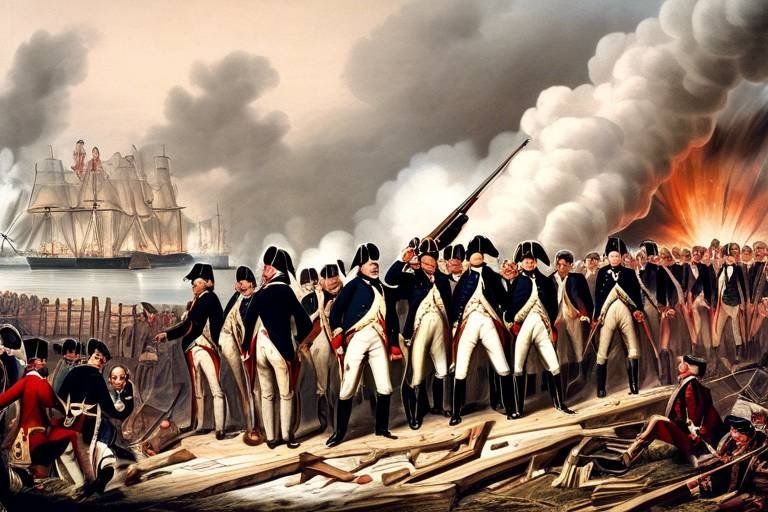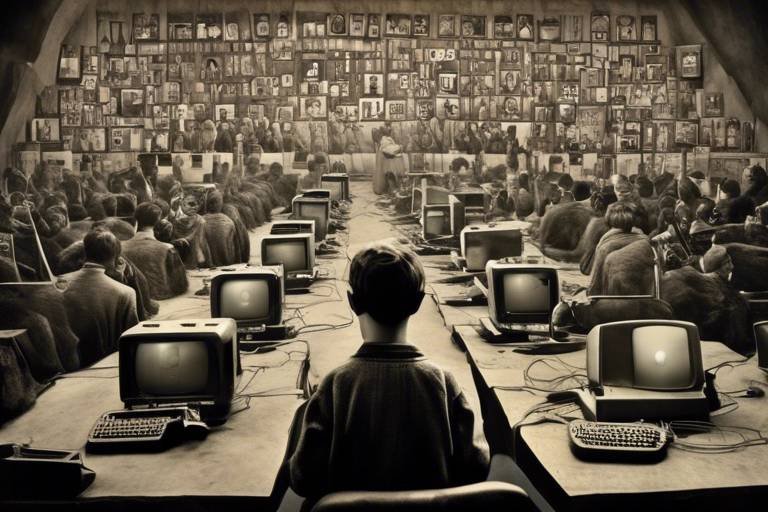The Social and Political Impact of the Reformation
The Reformation, a monumental movement that shook the very foundations of society and politics, had far-reaching effects that reverberated across Europe and beyond. This transformative period in history brought about a wave of change, sparking shifts in power dynamics, religious beliefs, economic structures, and cultural norms. The impact of the Reformation was not confined to the realm of religion; it permeated every aspect of life, leaving an indelible mark on the social and political landscape of the time.

Religious Fragmentation
Exploring the profound effects of the Reformation on society and politics, this article delves into various aspects of this transformative period in history.
The Reformation, spearheaded by figures like Martin Luther and John Calvin, sparked a wave of religious upheaval that shattered the unity of Christianity. The once monolithic faith splintered into various denominations, each with its own beliefs and practices. This fragmentation not only led to theological differences but also had far-reaching consequences for social cohesion and political alliances.

Shifts in Power
Exploring the profound effects of the Reformation on society and politics, this article delves into various aspects that were reshaped by this pivotal period in history. From religious fragmentation to economic changes and shifts in power dynamics, the Reformation left a lasting imprint on the fabric of European civilization.
One of the most significant outcomes of the Reformation was the redistribution of power from the Catholic Church to secular rulers. Previously, the Church held immense authority over both spiritual and temporal matters, exerting influence over monarchs and governments. However, with the rise of Protestantism and the weakening of the Church's hegemony, secular rulers seized the opportunity to assert their autonomy and establish new centers of power.
This shift in power dynamics led to a reconfiguration of political alliances and allegiances in Europe. As the authority of the Catholic Church waned, secular rulers gained greater autonomy and control over their territories. This newfound power allowed them to shape the course of political events and influence the direction of their respective regions.
Moreover, the emergence of Protestant states challenged the traditional dominance of Catholic monarchies, leading to a fragmentation of authority across the continent. The Reformation not only decentralized power but also sparked competition among various factions vying for supremacy in a rapidly changing political landscape.
Amidst these power struggles, the Reformation ushered in a new era where political authority was no longer solely concentrated in the hands of the Church. Secular rulers, emboldened by the spirit of religious reform, asserted their independence and reshaped the political map of Europe, laying the groundwork for the modern nation-state system.

Economic Changes
The Reformation brought about significant economic changes that reverberated throughout Europe. One of the key consequences was the redistribution of wealth and power, as the break from the Catholic Church led to the transfer of assets from religious institutions to secular authorities and individuals. This shift in wealth distribution had a profound impact on the economic landscape, altering trade patterns and contributing to the rise of capitalism.
Moreover, the Reformation stimulated the growth of new industries and economic sectors. Protestant work ethic, which emphasized hard work, thrift, and frugality, played a crucial role in fostering economic development. The emphasis on individual responsibility and the idea of a calling in one's profession spurred innovation and entrepreneurship, fueling economic growth in Protestant regions.
Additionally, the Reformation encouraged the development of education and literacy among the population. The Protestant emphasis on reading the Bible in vernacular languages led to increased literacy rates, expanding access to knowledge and information. This rise in literacy not only empowered individuals but also contributed to the growth of a more educated workforce, driving economic progress.
Furthermore, the Reformation's challenge to traditional religious authority and dogma created a more dynamic and competitive intellectual environment. This intellectual ferment fostered critical thinking and innovation, laying the groundwork for scientific and technological advancements that would shape the modern economy.
In conclusion, the economic changes brought about by the Reformation were profound and far-reaching. From wealth redistribution and the rise of capitalism to the promotion of education and literacy, the Reformation left a lasting impact on the economic development of Europe and set the stage for the emergence of the modern economy.

Education and Literacy
The Reformation brought about a significant shift in the emphasis on education and literacy, particularly among Protestants. Prior to this period, access to education was limited to the elite and clergy, but with the rise of Protestantism, there was a newfound focus on educating the general population. This emphasis on education was rooted in the belief that individuals should be able to read and interpret the Bible for themselves, rather than relying solely on the clergy for guidance.
Protestant reformers, such as Martin Luther and John Calvin, advocated for the establishment of schools to teach both boys and girls how to read and write. This push for literacy not only empowered individuals to engage with religious texts but also paved the way for the spread of new ideas and knowledge. As more people gained the ability to read, there was a surge in the dissemination of literature, including religious tracts, pamphlets, and academic works.
Furthermore, the promotion of education and literacy had broader societal implications beyond the religious sphere. It led to an increase in critical thinking skills and a more informed citizenry capable of engaging in intellectual discourse. This, in turn, contributed to the development of a more enlightened and progressive society, where ideas could be shared and debated freely.
The impact of the Reformation on education and literacy was profound, laying the foundation for the modern educational systems we have today. By prioritizing the importance of learning and knowledge, the Reformation not only transformed the religious landscape but also played a crucial role in shaping the intellectual and cultural fabric of European society.

Gender Roles
When we delve into the impact of the Reformation on society, one crucial aspect that cannot be overlooked is the transformation it brought about in gender roles. The Reformation challenged traditional views on the roles of men and women within the family and society, sparking debates and reshaping societal norms.
During this period, women found themselves in a new light, with some actively participating in the spread of Protestant ideas and others advocating for their own rights within the church and society. The Reformation provided a platform for discussions on the role of women in religious practices, education, and public life, leading to shifts in perceptions and expectations.
On the other hand, men also experienced changes in their roles as the Reformation emphasized the importance of individual interpretation of religious texts and personal faith. This shift in religious authority from the clergy to the individual believer had implications for how men viewed their responsibilities within the family and community.
Moreover, the Reformation influenced the concept of marriage and family dynamics, with Protestant teachings emphasizing the mutual respect and partnership between spouses. This had a ripple effect on societal norms and expectations regarding marriage, parenting, and the division of labor within households.
As a result of the Reformation's impact on gender roles, we witness a gradual evolution in how men and women were perceived and their respective roles in society. This shift in attitudes towards gender laid the foundation for future discussions on equality, empowerment, and social justice.

War and Conflict
The Reformation, a pivotal period in European history, brought about significant changes that reverberated across social and political spheres. This article delves into the multifaceted impact of the Reformation on various aspects of society, from religious fragmentation to economic transformations and cultural shifts.
War and conflict were inherent outcomes of the religious turmoil sparked by the Reformation. The theological disagreements between Catholics and Protestants escalated into violent confrontations, most notably culminating in the devastating Thirty Years' War. This protracted conflict, fueled by religious fervor and political ambitions, left a trail of destruction across Europe, reshaping the geopolitical landscape.
Religious differences became a catalyst for bloody battles and power struggles, as rulers sought to assert their authority and impose their religious beliefs on their subjects. The clash between Catholic and Protestant forces not only led to widespread devastation but also deepened existing societal divisions, exacerbating tensions and sowing seeds of animosity that persisted for generations.
The impact of these religious conflicts extended far beyond the battlefield, permeating every aspect of society. Communities were torn apart, families divided, and trust shattered as the specter of war loomed large over Europe. The scars of these conflicts left a lasting imprint on the collective memory of nations, shaping their identities and influencing future interactions.

Art and Culture
Exploring the transformative effects of the Reformation on society and politics, this article delves into various aspects shaped by this significant historical movement.
Amidst the upheaval brought about by the Reformation, art and culture underwent a profound metamorphosis. The traditional religious themes that had long dominated artistic expression began to shift, reflecting the changing ideologies of the time. Artists embraced new forms of representation, moving away from the ornate and elaborate styles favored by the Catholic Church. Instead, they sought to convey deeper, more personal messages through their work, often drawing inspiration from the evolving religious landscape.
One notable development was the rise of Protestant iconoclasm, which saw the destruction of religious images and symbols deemed idolatrous. This iconoclastic fervor not only altered the visual landscape of churches and public spaces but also sparked a reevaluation of the role of art in society. Artists grappled with questions of artistic freedom, the power of imagery, and the boundaries between the sacred and the profane.
Moreover, the Reformation era witnessed the emergence of new art forms and genres that reflected the changing cultural climate. From the stark simplicity of Protestant church interiors to the intricate symbolism of allegorical paintings, artists explored diverse avenues of expression. The printing press, a technological innovation of the time, played a crucial role in disseminating artistic ideas and facilitating the spread of visual culture.
As artistic styles evolved, so too did cultural norms and values. The Reformation challenged established conventions and encouraged a spirit of inquiry and experimentation. Artists found themselves at the forefront of this cultural revolution, pushing boundaries and redefining the role of art in society. The legacy of this period continues to resonate in contemporary art and culture, reminding us of the enduring impact of the Reformation on artistic expression and cultural identity.

Colonial Expansion
Colonial Expansion played a significant role in the aftermath of the Reformation, as European powers sought to expand their influence and spread Christianity to new territories across the globe. The religious fervor and zeal that characterized the Reformation era also fueled colonial ventures, with many seeing the exploration and conquest of new lands as a way to further the spread of their religious beliefs.
European nations, particularly Spain and Portugal, embarked on ambitious colonial expeditions, establishing colonies in the Americas, Africa, and Asia. These colonial ventures were often intertwined with missionary efforts, as Christian missionaries accompanied explorers and settlers, aiming to convert indigenous populations to Christianity.
The colonial expansion driven by the Reformation had far-reaching consequences, not only for the colonized territories but also for the European powers involved. The establishment of colonies led to the exploitation of resources, the displacement of indigenous peoples, and the imposition of European cultural norms and values.
Moreover, the spread of Christianity through colonial expansion had a lasting impact on the religious landscape of the newly colonized regions. The introduction of Christianity reshaped local belief systems, often leading to syncretic forms of worship that blended indigenous traditions with Christian teachings.
Overall, the colonial expansion spurred by the Reformation was a complex and multifaceted phenomenon that shaped the course of history and continues to influence global dynamics to this day.

Legacy and Continuity
The legacy of the Reformation continues to shape modern society in profound ways. The movement's impact on politics, religion, and culture has left a lasting imprint on the world we live in today. One of the key legacies of the Reformation is the concept of religious freedom and individual interpretation of faith. This idea laid the groundwork for the development of modern democracy and the separation of church and state.
Furthermore, the Reformation sparked a wave of religious and social reforms that continue to influence societal norms and values. The emphasis on personal responsibility and moral autonomy introduced during this period has had a lasting impact on ethical standards and social justice movements.
In terms of cultural legacy, the Reformation led to the proliferation of new forms of artistic expression and literary works that challenged traditional beliefs and values. This period saw the rise of humanism and the promotion of critical thinking, which have become integral parts of modern intellectual discourse.
Moreover, the Reformation's impact on education and literacy has had long-lasting effects on global literacy rates and access to knowledge. The emphasis on education among Protestants paved the way for the establishment of schools and universities, democratizing learning and fostering intellectual growth.
On a political level, the Reformation contributed to the decentralization of power and the rise of nation-states, laying the foundation for the modern political landscape. The movement's influence on governance and political philosophy continues to shape contemporary debates on authority, governance, and individual rights.
Overall, the legacy of the Reformation is a complex tapestry of social, political, and cultural transformations that have left an indelible mark on the world. By understanding and appreciating the enduring impact of this historic movement, we can gain insights into the evolution of modern society and the ongoing quest for freedom, equality, and justice.
Q: What were the main causes of the Reformation?
A: The Reformation was primarily sparked by grievances against the Catholic Church, including corruption, indulgences, and the lack of access to religious texts among the general population.
Q: How did the Reformation impact religious diversity?
A: The Reformation led to the fragmentation of Christianity and the emergence of various Protestant denominations, increasing religious diversity and challenging the dominance of the Catholic Church.
Q: What role did the Reformation play in the development of modern democracy?
A: The Reformation contributed to the idea of religious freedom and individual conscience, laying the groundwork for concepts of liberty, equality, and democracy that are central to modern political systems.
Q: How did the Reformation influence art and culture?
A: The Reformation led to changes in artistic styles and themes, promoting new forms of expression that reflected the evolving religious and social landscape of the time.
Frequently Asked Questions
- What was the main trigger for the Reformation?
The Reformation was primarily sparked by grievances against the practices and doctrines of the Catholic Church, such as the sale of indulgences and the authority of the Pope.
- How did the Reformation impact the social fabric of Europe?
The Reformation led to religious fragmentation, causing societal divisions and conflicts as different denominations emerged, challenging traditional power structures and social norms.
- What role did education play in the Reformation?
Education was crucial in the Reformation as Protestant emphasis on literacy and access to scripture empowered individuals to interpret religious texts independently, fostering the spread of new ideas.
- Did the Reformation have any lasting effects on modern society?
Absolutely, the Reformation's impact can still be seen today in the diversity of Christian denominations, the separation of church and state, and the influence on cultural and political structures across the globe.



















